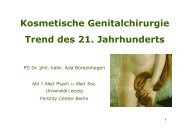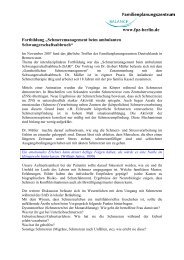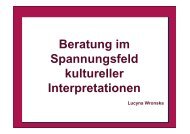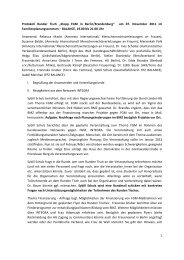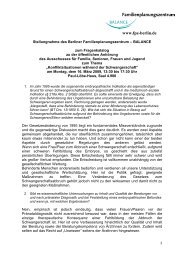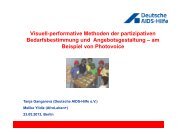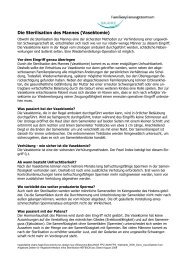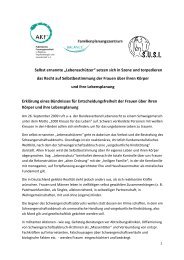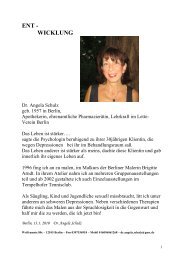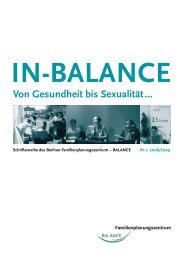Listening to African Voices - FPZ
Listening to African Voices - FPZ
Listening to African Voices - FPZ
Create successful ePaper yourself
Turn your PDF publications into a flip-book with our unique Google optimized e-Paper software.
study does not provide information on the original sociodemographicprofile of the study subjects (AfrikanischeFrauenorganisation in Wien 2000).The second study was carried out in Germany by TDF, theBund der Frauenaerzte (association of gynaecologists) andUNICEF. They approached the issue from a different angleand sent out a questionnaire <strong>to</strong> 13.182 gynaecologists inGermany. The response rate was at 3.7% with 493 returnedquestionnaires. Among the 493 respondents• 35 (7%) knew about patients who wanted <strong>to</strong> subjecttheir daughters <strong>to</strong> FGM/C in their home country;• 48 (10%) claimed <strong>to</strong> have heard about girls beingsubjected <strong>to</strong> the practice in Germany• 3 (1%) had been asked <strong>to</strong> practice FGM/C on thedaughters of immigrants (Bund der Frauenärzte,Terre des Femmes & UNICEF 2005).Apart from these two studies, there is anecdotal materialthat supports the evidence of FGM/C being carried out inGermany. Several medical doc<strong>to</strong>rs reported having been approachedby parents <strong>to</strong> perform FGM/C. There was also an incidentin Berlin regarding a medical doc<strong>to</strong>r of Egyptian originwho agreed <strong>to</strong> practice FGM/C for about 600 euros. He wasfilmed using a hidden camera but the charges against himwere dropped due <strong>to</strong> lack of evidence. In other cases, parentsof Gambian and Ethiopian origin were suspected of havingthe intention of subjecting a daughter <strong>to</strong> FGM/C. The claimswere reported by German citizens <strong>to</strong> the authorities or NGOs.Unlike in France, however, no case of FGM/C on German soilhas ever been made public (Sandberg 2008; EMMA 2009).4.7.3. Perceptions of <strong>African</strong> immigrants on FGM/C in GermanyThe number of studies looking at the perceptions of <strong>African</strong>immigrants in Germany is small. We identified two relevantstudies that aim at exploring the perceptions and practices ofimmigrant women.The first research was conducted by a non-governmentalorganisation entitled “Freundeskreis Tambacounda”. Theobjectives were <strong>to</strong> analyse the situation regarding FGM/Cin the state of Niedersachsen, <strong>to</strong> explore the personal andsocial perceptions of women concerned and <strong>to</strong> evaluate thenature of medical assistance provided <strong>to</strong> them. The data collectionconcentrated on five cities (Hannover, Braunschweig,Göttingen, Osnabrück and Oldenburg). Based on the FGM/Ccountry prevalence rates and the official records of <strong>African</strong>immigrants in the areas of data collection, it was estimatedthat 340 circumcised women reside in the five targeted cities.An analysis of the opinions of the women concerned, howeverdid not take place: the researchers were not able <strong>to</strong>identify women from practicing families who were availableand willing <strong>to</strong> give interviews. The data collection withmedical doc<strong>to</strong>rs and midwives was more successful: theirfeedback included the finding that the women concernedusually seek care during pregnancy or immediately beforedelivery. The respondents reported that communicationobstacles due <strong>to</strong> language barriers were common. This wasperceived as an obstacle for explaining complications associatedwith FGM/C or for conducting awareness raising. As aconsequence, the <strong>to</strong>pic was often not discussed during theconsultations. Furthermore, it had observed that episio<strong>to</strong>myand C-sections were the most common complications ofcircumcised women; de-infibulation requests were reportedfor three women (Freundeskreis Tambacounda e.V. 2003).The second study was conducted by Asefaw (2007), a medicaldoc<strong>to</strong>r of Eritrean origin. Asefaw investigated the effectsof FGM/C in two different samples. The participants of thefirst sample were women living in Eritrea. Those of the secondsample were immigrant women of Eritrean origin wholive in Germany.Asefaw’s findings indicate that gynaecological treatments inGermany are often very negative, even traumatising experiencesfor women who have undergone infibulation. They areexposed <strong>to</strong> incomprehension, inappropriate emotional reactionsand public exhibition of their status by the attendinghealth personnel. Lack of knowledge of the effects of FGM/Cand false diagnoses were further reported inconveniences.As a consequence, many of the women concerned avoidgynaecological consultations. The findings also indicated thatthe context of migration often changes the way the womenperceive FGM/C. While the women used <strong>to</strong> consider FGM/Cas something normal and positive in their home community,they start having ambiguous feelings <strong>to</strong>wards the practiceafter arriving in Germany where people see FGM/C as aviolent crime. The change of perception and the growingawareness that the organs have been severely damaged,can lead <strong>to</strong> severe emotional suffering. Asefaw highlightsas a cause the one-sided focus of the public discussions onFGM/C. The practice is presented as a cruel act in which girlsand women are victims of incredible suffering without mentioningthe complex socio-cultural contexts that surround thepractice. Testimonies and case studies illustrate that the wayof dealing with FGM/C in Germany is experienced as psychologicalviolence by the women concerned. The stigmatisingand discriminative treatments often lead <strong>to</strong> feelings ofdepression and loss of identity. Asefaw draws the conclusionthat the current public discourse against FGM/C in Germanyis contra-indicated for the promotion of the abandonment ofthe practice. It deprives the women concerned of emotionaland psychological resources instead of reinforcing their efforts<strong>to</strong> change their behaviour (Asefaw 2007).<strong>Listening</strong> <strong>to</strong> <strong>African</strong> <strong>Voices</strong> 25





